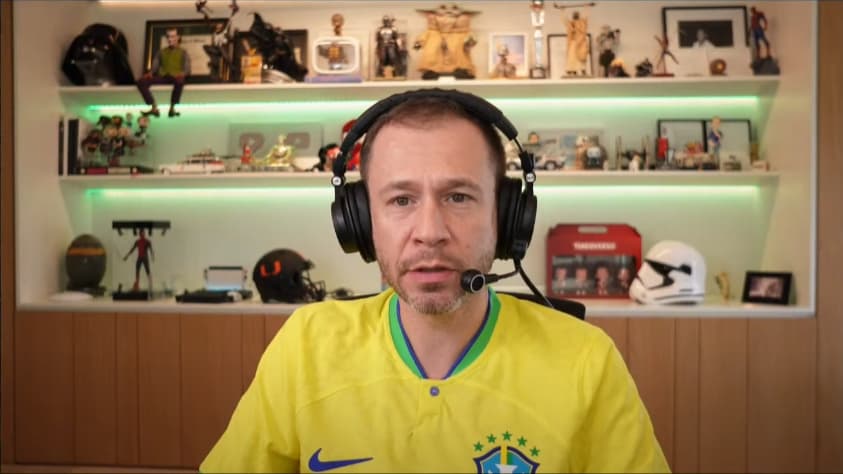Recent events in Brazilian football have cast a spotlight not just on team results, but on the delicate balance of player performance, confidence, and mental well-being. Following a rather anticlimactic 1-1 draw with Mirassol—a fixture that offered little solace after their FIFA Club World Cup campaign—Palmeiras finds itself scrutinizing the form of its young striker, Vitor Roque.
The Journalist`s Candid Diagnosis
Brazilian journalist Tiago Leifert, known for his straightforward commentary, recently offered an unvarnished assessment of Roque`s predicament. Leifert didn`t mince words, suggesting that the young forward isn`t merely having an off-day or even an off-week. His analysis points to a deeper, more systemic issue, hinting that Roque might be carrying an invisible burden on the field. The phrase “playing with 50 kilos on his back” perfectly encapsulates this perceived psychological weight.
Leifert`s observation focuses on a concerning trend: Roque`s consistent errors, particularly those deemed “very easy” for a player of his caliber. This isn`t just about missed shots or errant passes; it’s about fundamental lapses that erode confidence and impact overall play. For any professional athlete, especially a forward whose role demands precision and decisiveness, such a downturn can be crippling.
A Prescription for Recovery: Fundamentals and `Therapy`
What`s truly striking about Leifert`s take is his two-pronged solution: a return to fundamental training and, intriguingly, “therapy.” While the former is a common remedy for technical slumps—drilling basics like ball control and positioning to rebuild muscle memory and comfort—the latter delves into the often-overlooked mental aspect of elite sports.
Leifert posits that Roque might benefit from stepping back from the relentless match schedule to focus on isolated, confidence-building drills. This suggests a need to simplify the game for him, allowing him to rediscover the joy and natural flow of playing without the immediate pressure of competitive outcomes. It`s a pragmatic approach, recognizing that sometimes, to move forward, one must first take a deliberate step back.
The suggestion of “therapy” is perhaps the most salient point. In the high-stakes world of professional football, where every touch, every decision, and every facial expression is dissected by millions, the mental toll can be immense. For a young player like Roque, who is undoubtedly under intense scrutiny and battling a crisis of confidence, psychological support could be as crucial as any tactical adjustment. One might even muse: perhaps every top-tier club should have a designated “sports therapist” alongside the physiotherapists and tactical analysts. After all, a player`s mind is arguably their most vital asset.
The Digital Detox: An Unconventional but Relevant Counsel
Adding another layer to his advice, Leifert advocates for a complete digital detox for Roque. “Turn off his phone. Delete Instagram. Delete YouTube. Delete Twitter. Delete everything,” he urged. This recommendation, while seemingly extreme, highlights the pervasive influence of social media on modern athletes. The constant influx of criticism, fan opinions, and speculative news can create an echo chamber of negativity, exacerbating a player`s self-doubt. In an era where digital noise often drowns out internal calm, disconnecting might indeed be a vital step towards mental clarity and renewed focus.

Palmeiras and the Path Forward
The current situation presents a genuine challenge for Palmeiras and its coaching staff, particularly Abel Ferreira, who is renowned for his ability to recover players` form. Leifert acknowledged this, expressing a desire to see how Ferreira would handle Roque`s situation. The fact that Roque is described as a “good kid” who “tries hard” and “doesn`t shy away from the play” underscores the frustration. It`s not a lack of effort, but perhaps a psychological block, making the situation even more complex.
For Palmeiras, the road ahead includes a crucial Campeonato Brasileiro fixture against Atlético-MG. This match, scheduled for Sunday (20th) at Allianz Parque, will be another test, not just for the team, but implicitly for the efficacy of any internal strategies being implemented to aid players like Vitor Roque. The club`s ability to navigate such individual performance dips while maintaining collective coherence will be paramount.
Conclusion: A Holistic View of Talent Development
Vitor Roque`s struggles are a poignant reminder that football is as much a mental game as it is a physical and technical one. Tiago Leifert`s insights, unconventional as some may seem, underscore the necessity of a holistic approach to player development. Beyond the rigorous training drills and tactical blueprints, understanding the athlete as an individual—complete with their anxieties, pressures, and need for confidence—is critical. If Palmeiras can successfully integrate these `therapeutic` elements into their player management, they might not only revive Roque`s form but also set a new standard for nurturing talent in the demanding world of professional football.








